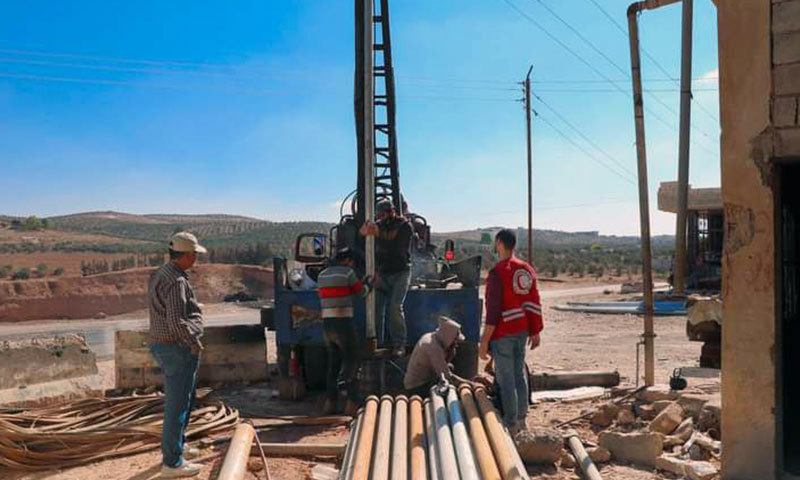



Daraa – Halim Muhammad
The Syrian Arab Red Crescent (SARC) has maintained only a well out of 12 artesian wells in the southern city of Daraa al-Balad to irrigate olive crops in the upcoming summer.
The Shaiyah wells, which are under the supervision of the Daraa Agriculture Directorate, have been out of service for three years since the Syrian regime forces took full control of the southern region, following settlement agreements in 2018.
The Syrian opposition in the southern region was operating wells in the Shaiyah area, providing drinking and irrigation water for the residents of Daraa al-Balad.
A member of a relief committee, who spoke on condition of anonymity for security reasons, told Enab Baladi that the wells irrigate only 50 percent of the areas of olive crops in the Shaiyah area.
The sulfur water of the Shaiyah is not suitable for drinking, but people were using it for drinking during the opposition factions’ control of the area after the regime cut off the city’s drinking water supplies.
Abdulfattah al-Rahhal, former director of agriculture in Daraa, opposed restoring the wells in the Shaiyah area, according to the member of the relief committee. But, the director of agriculture, Bassam al-Hashish, promised to rehabilitate three more wells, in addition to the restoration of al-Khawabi and al-Khashabi wells.
The Directorate of Agriculture has appointed guards to protect the wells and since people living near the wells are the first group to benefit from the water. They are also responsible for protecting the wells.
In July 2021, the Syrian regime’s elite forces of the Fourth Division deprived the residents of Daraa al-Balad of using wells in the area, as the water of Khirbet Ghazaleh wells, east of Daraa city, and the wells of al-Shaiyah were cut off, so the water source for people at that time was a low-level wells.
According to SARC’s Facebook account, the maintenance of the well provides irrigation and drinking water for 1,100 farmers in the region to irrigate about 150 hectares of agricultural land.
The maintenance included the rehabilitation of the concrete reservoir, the installation of a solar energy system, in addition to the installation of an electrical transformer.
A local farmer told Enab Baladi that operating agricultural wells has encouraged him to irrigate his olive crop after stopping it for three years.
The farmer, who asked not to be named for security reasons, expected a good harvest next year.
Some farmers own water tank tractors where the cost of 5 cubic meters is 30,000 Syrian pounds (SYP = 8 USD) before operating the well.
However, after operating the well, the main cost of watering the crop will be lower compared to operating the tractor, especially with the lack of permanent fuel, and its high price, as the price of one liter of diesel reached 3200 SYP (about 90 US cents).
Daraa al-Balad countryside is famous for the cultivation of olives, and one of the most important varieties is Nabali (of Palestinian origin), which is suitable for the sandy soil in the area.
The areas of the Shaiyah, al-Khashabi, and al-Nakhla were attacked by the regime forces several times during July 2021.
Troops of the Fourth Division also robbed some farms, cut down some olive trees, and stole the possessions of some farmers like tanks and agricultural equipment.
The Syrian Ministry of Agriculture estimated olive production this year at 645,000 tons, compared to 850,000 tons for 2021, according to the state-run Syrian Arab News Agency (SANA).
Meanwhile, the Daraa Agriculture Directorate expected 2,500 tons of oil to be produced for this season.
According to SANA, the Shaiyah well is one of the wells of the Green Belt Project, which was established in 1983 to afforestation of the border area from Tal Shihab, west of Daraa, to the town of Umm Walad, adjacent to the As-Suwayda governorate. It includes 19 villages, 40 km long and 10 to 15 km wide.
if you think the article contain wrong information or you have additional details Send Correction